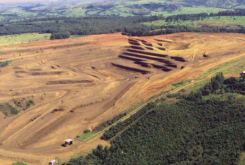Recent attacks in northern Mozambique suggest that the capture and prosecution of alleged militants in the region last year has failed to solve the problem. Workers related to the emerging liquefied natural gas [LNG] industry have been attacked for the first time and foreign investors are concerned about the violence, while human rights NGOs are worried about the tactics they have employed.
Attacks on two convoys heading to the LNG project site left at least one contractor dead and six injured in February. The murdered man appears to have been an employee of Portuguese construction company Gabriel Couto, which is building the new airport at Afungi. The facility is being developed to serve the gas industry.
While analysts have long suggested that the militants could attack oil and gas industry targets, this was the first time that they have actually done so. However, it is not clear whether they specifically targeted the vehicles because they carried gas industry subcontractors, or whether they were attacked at random, as some accounts have suggested. Despite the assaults, a spokesperson for one of the main investors, US firm Anadarko, said: “We expect to continue moving the project toward FID [final investment decision], according to our current schedule”.
Investors were already concerned about potential attacks. In June 2018, Anadarko put its staff under “lock-down”, meaning that they were forbidden from leaving the perimeter of the planned LNG plant site. In addition, the attacks may have been one of the reasons Wentworth Resources announced in December that it had decided to give up its onshore acreage in the area despite discovering natural gas. Following the February attacks, interior minister Jaime Basílio Monteiro pledged to deploy military personnel in the area.
The first attack was undertaken in October 2017 in and around Mocímboa da Praia and according to Jane’s Terrorism and Insurgency Centre, there have been 19 recorded attacks since October 2017. Estimates of the numbers of people murdered in the attacks since 2017 vary but range into the hundreds, with many of those killed by beheading.
In addition, thousands of houses, police stations and mosques have been burnt down, and cattle slaughtered. The attacks have been carried out across a swathe of land from the provincial capital Pemba up to the River Rovuma, which forms the border with Tanzania, and western governments have advised against travel to the area. The absence of official statements by the militants exacerbates the lack of information about them.
Militant background
Many claim that the group came out of nowhere but a movement preaching a stricter interpretation of Islam did emerge in Mozambique after the turn of the millennium. Ever stricter splinter groups were set up, in some cases trying to enforce a ban on alcohol, apparently culminating in the militant organisation that terrorises the region today. It has been reported that more mainstream Muslim groups repeatedly asked the government to intervene to protect villagers.
The group was originally named Ahlu Sunnah Wa-Jama, which means ‘followers of the prophet’ in Arabic, but is locally known as Al-Shabaab, although no link to Somalia’s Al-Shabaab group has been demonstrated. Mozambique previously had no history of Islamist attacks. Muslims comprise 18% of the population of Mozambique but are in the majority in Cabo Delgado.
Government statements fluctuate between blaming international jihadists and unemployed local people eager for a slice of the gas riches. It had hoped that the insurgency had been brought under control after a spate of arrests last year. A total of 189 people were charged in conjunction with the attacks and their trial began in Pemba in October but few details of the trial have been released.
It is understood that even more suspected militants have been detained, including 50 Tanzanians and an unspecified number of other foreigners. In December, local people handed a man named Mustafa Suale Machinga over to the Mozambican army, claiming that he was the head of the group, but most sources indicate that there are several leaders.
Tanzanian police announced in October that they had arrested 104 suspected militants they believe were planning to carry out attacks in Mozambique. Others were killed during police operations. There are long standing links across the border between Tanzanian and Mozambican Islamists and indeed Muslim communities more generally, and it seems that some Tanzanian extremists sought refuge in northern Mozambique following a crackdown by the Tanzanian authorities.
NGO Human Rights Watch says that security forces operating in the region have committed serious human rights violations, while journalists in the area have been arrested. Any indiscriminate and heavy-handed responses by the Mozambican army will further upset relations with local communities. As the experience of the Niger Delta has demonstrated, this is neither wise nor effective. Apart from anything else, the military offensive has not halted the violence. At least 13 more civilians were killed in renewed attacks in March, including on the villages of Ulo, Maculo and Nabajo in Mocímboa da Praia.
The investors could employ a convoy system with security protection to transport workers and equipment to the plant site. Alternatively, it could opt for air rather than road transport, although Afungi airport is not expected to be completed until 2021 at the earliest. It is possible that security firms will be employed to safeguard the project. Frontier Services Group, which is chaired by Erik Prince, the founder of Blackwater Security, has already offered its services.
The LNG industry
At least US$40 billion is expected to be invested in the LNG scheme at Afungi in Cabo Delgado province, where two consortia are building separate LNG plants. Anadarko holds a 26.5% stake in Mozambique LNG, alongside partners Mitsui (20%), ONGC Videsh (16%), Mozambique’s state owned Empresa Nacional de Hidrocarbonetos (ENH) (15%), Bharat PetroResources (10%), PTT Exploration & Production of Thailand (8.5%) and Oil India (4%). Offshore Area 1, including the Atum and Golfinho fields, will supply gas to the project’s first two production trains – as production lines are known in the industry – each with production capacity of 6.44 million tonnes/year.
The other onshore project, which is named Rovuma LNG, is operated by Mozambique Rovuma Venture (70%), with the remaining equity held by Kogas, Galp Energia and ENH, with 10% each. Mozambique Rovuma Venture is owned by Eni (35.7%), ExxonMobil (35.7%) and China National Oil and Gas Exploration and Development Corporation (CNODC) (28.6%).
Gas will be supplied by Area 4’s Mamba fields. Its two trains will have 7.6 million tonnes/year production capacity, making them the biggest LNG trains in the world outside Qatar, which is the world’s biggest producer. Eni also operates a third project, the $10 billion Coral Sul venture, but this is a floating LNG project that will be located at sea and so it should be sheltered from any onshore violence.
Anadarko is expected to take the FID on its side of the project in the near future. The US firm signed long term sales agreements with India’s Bharat and Pertamina of Indonesia earlier this year and has now concluded sales and purchase agreements for close to 10 million tonnes/year of its plant’s expected 12.88 million tonnes/year capacity. Projects now usually seek to keep a proportion of their production capacity to sell via short term deals on the spot markets. ExxonMobil and Eni also plan to take the FID on their project this year.
For its part, the government of Mozambique is understandably keen to bring militant activity under control and hopes that both consortia will decide to proceed with their ventures before October’s national elections. The Afungi plant will be the biggest single investment in Mozambique’s history and will provide a huge boost to the economy at a time when the government’s financial dealings have been heavily criticised.
Diffusing discontent
The government and the oil and gas companies involved should be acutely aware of the possibility of northern Mozambique turning into a new version of the Niger Delta. Despite spending billions of dollars on security personal, surveillance and technological protection, the international oil companies that dominate the Nigerian oil industry have been unable to stem militant attacks and petro-criminal activities.
There is little chance that northern Mozambique could be as vulnerable to petro-crime, as it is very difficult to find a commercial outlet for illicit gas in comparison with crude oil or natural gas liquids. In addition, the gas feedstock for the LNG plant will be supplied by offshore wells in the Rovuma Basin that will be much easier to protect that the thousands of onshore and shallow water oil wells that pockmark the Niger Delta.
However, the authorities and investors must learn from the Nigerian experience by ensuring that local people benefit from the investment as soon as possible, and not just in the form of development projects and low paid security and catering employment. Cabo Delgado is one of the poorest in Mozambique and can feel very distant from Maputo. Substantial investment needs to be made in training local people for more skilled roles and in promoting wider economic development in Cabo Delgado.
At the very least, wide inequality will fuel local resentments. Like the other investors, Anadarko has already said that it is committed to maximising its use of local workers and companies. A small proportion of gas production can be set aside to supply a power plant to drive electrification in the region.
The government should seize the opportunity to promote genuine economic development in a region that has benefitted little from the economic growth that has been registered further south. Moreover, using LNG investment as a springboard for local economic development would help Mozambique avoid the Oil Curse that has afflicted the Niger Delta and other oil producing regions, whereby an obsession with oil leads to other sectors being overlooked.
All of this should not be taken to suggest that the attacks are part of general local opposition to the LNG industry. Apart from anything else, the vast majority of the victims have been local people. Yet local dissatisfaction can create the discontent within which militant groups can prosper.(CLBrief)



